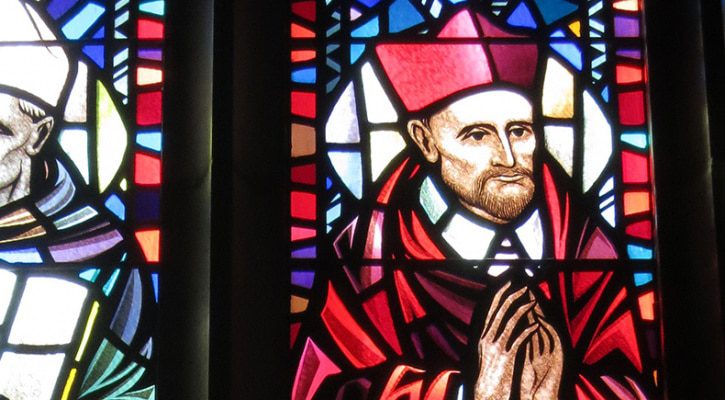
Image: Detail | Stained glass window in Saint Anthony of Padua Catholic Church, Dayton, Ohio | photo by Nheyob
Saint of the Day for September 17
(October 4, 1542 – September 17, 1621)
Saint Robert Bellarmine’s Story
When Robert Bellarmine was ordained in 1570, the study of Church history and the fathers of the Church was in a sad state of neglect. A promising scholar from his youth in Tuscany, he devoted his energy to these two subjects, as well as to Scripture, in order to systematize Church doctrine against the attacks of the Protestant Reformers. He was the first Jesuit to become a professor at Louvain.
His most famous work is his three-volume Disputations on the Controversies of the Christian Faith. Particularly noteworthy are the sections on the temporal power of the pope and the role of the laity. Bellarmine incurred the anger of monarchists in England and France by showing the divine-right-of-kings theory untenable. He developed the theory of the indirect power of the pope in temporal affairs; although he was defending the pope against the Scottish philosopher Barclay, he also incurred the ire of Pope Sixtus V.
Bellarmine was made a cardinal by Pope Clement VIII on the grounds that “he had not his equal for learning.” While he occupied apartments in the Vatican, Bellarmine relaxed none of his former austerities. He limited his household expenses to what was barely essential, eating only the food available to the poor. He was known to have ransomed a soldier who had deserted from the army and he used the hangings of his rooms to clothe poor people, remarking, “The walls won’t catch cold.”
Among many activities, Bellarmine became theologian to Pope Clement VIII, preparing two catechisms which have had great influence in the Church.
The last major controversy of Bellarmine’s life came in 1616 when he had to admonish his friend Galileo, whom he admired. He delivered the admonition on behalf of the Holy Office, which had decided that the heliocentric theory of Copernicus was contrary to Scripture. The admonition amounted to a caution against putting forward—other than as a hypothesis—theories not yet fully proven. This shows that saints are not infallible.
Robert Bellarmine died on September 17, 1621. The process for his canonization was begun in 1627, but was delayed until 1930 for political reasons, stemming from his writings. In 1930, Pope Pius XI canonized him, and the next year declared him a doctor of the Church.
Reflection
The renewal in the Church sought by Vatican II was difficult for many Catholics. In the course of change, many felt a lack of firm guidance from those in authority. They yearned for the stone columns of orthodoxy and an iron command with clearly defined lines of authority. Vatican II assures us in The Church in the Modern World, “There are many realities which do not change and which have their ultimate foundation in Christ, who is the same yesterday and today, yes, and forever” (#10, quoting Hebrews 13:8).
Robert Bellarmine devoted his life to the study of Scripture and Catholic doctrine. His writings help us understand that the real source of our faith is not merely a set of doctrines, but rather the person of Jesus still living in the Church today.
Saint Robert Bellarmine is the Patron Saint of:
Catechists
Catechumens
Click here for quotes from Catholic saints!
Posted by Franciscan Media.
Daily Reading
Memorial of Saints Basil the Great and Gregory Nazianzen, Bishops and Doctors of the Church
Readings for the Memorial of Saints Basil the Great and Gregory Nazianzen, Bishops and Doctors of the Church Reading 1 1 John 2:22-28 Beloved: Who is the liar? Whoever denies…
Daily Meditation
A Voice in Today’s WildernessUna voz en la jungla de hoy día
Click here for daily readings Today’s Gospel passage is especially relevant as we begin a new year with resolutions and hope. In this reading we hear John’s declaration echoing the…




